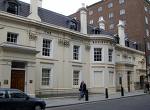William Kingdon 1788 - 1863
January 23, 2009
 William Kingdon 1788 -
1863 was a British physician and surgeon, the President of the Medical
Society of
London,
who practiced both homeopathy and allopathy.
William Kingdon 1788 -
1863 was a British physician and surgeon, the President of the Medical
Society of
London,
who practiced both homeopathy and allopathy.
Kingdon emphasised that demand from patients was the main reason why homeopathy spread so widely.
Accordingly, Kingdon sought an audience, though he remained a skeptic, with Frederick Hervey Foster Quin to discover more about this ‘homeopathy’ his clients were demanding so vociferously.
Frederick Hervey Foster Quin spent a considerable time with William Kingdon, and they conducted some clinical trials together which convinced Kingdon considerably. Frederick Hervey Foster Quin gave him some remedies to trial on his clients, and Kingdon even used homeopathic remedies to cure his wife of an inflammation of the jaw, because she specifically requested chamomilla.
In 1827, Kingdon had a flourishing, well heeled practice, which he described in a speech given to the Medical Society of London, of which he was President. Thomas Uwins accompanied him and spoke alongside him. Thomas Uwins was ridiculed and William Kingdon met with a storm of disbelief. Nevertheless, William Kingdon gave his due to Samuel Hahnemann for his industry in ascertaining the properties of medicines.
Reluctantly, Kingdon came to accept homeopathy, though he was clearly torn. His allopathic colleagues riduculed him, his patients loved him, and he could see for himself how well homeopathy worked, but he could not give up the allopathic treatments he also believed in.
In 1836, Kindon published an article in The Lancet proposing homeopathy to his colleagues, but he had but an imperfect grasp of his subject and his indecision shone through.
However, Kingdon was honest enough to exclaim that homeopathy had shaken him up, and that ’the trouble was immense’ as he ‘had grown idle’ as an allopath.
In 1837, William Kingdon was only one of ten homeopaths practicing in London alongside Guiseppe Belluomini, Hugh Cameron, Edward Cronin, Paul Francois Curie, Harris F Dunsford, Victor Massol, Stephen Simpson, Francesco Taglianini, and Thomas Uwins,
In 1844, Kingdon wrote up some cases cured by homeopathy which he published in The Lancet. Kingdon was troubled because he did not know why these cases were cured by homeopathy, unless it be due to similia similibus curantur.
William Kingdon was subject to much allopathic ridicule, and from James Young Simpson.
In 1849, William Kingdon was working at the Exeter Homeopathic Dispensary alongside Arthur Guinness, and submitting cases to homeopathic publications. At this time, William Kingdon was a member of the British Homeopathic Society.
Of necessity he suffered loss from halting between two opinions on so important a subject.
During the last years of his life we believe he repudiated Homeopathy; we can afford to make this statement. He was a worthy physician, and so peace to his name. Marmaduke Blake Sampson, in Truths and Their Relation to Homeopathy, p. 52, gives a paper read before the Medical Society of London in 1836, in which he gives reasons for belief in Homeopathy: this was published in The Lancet for October 15, 1836. (Mod. Hom. Rev, vol. 7, p. 123 ; Zeit. f. hom. Klinik, vol. 12, p. 26.)
Of interest:
Broughton Kingdon was on the Medical Council of the London Homeopathic Hospital in 1850.